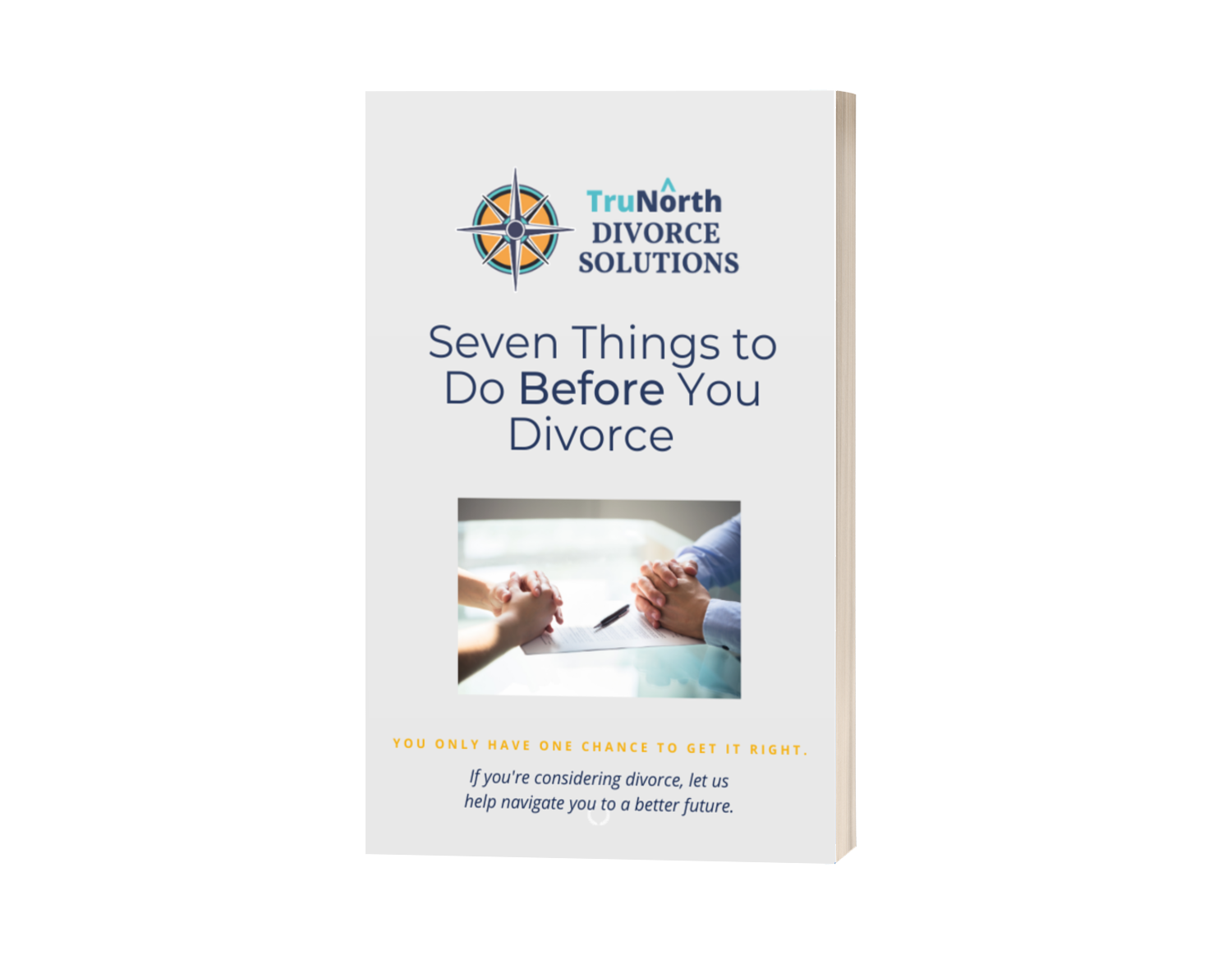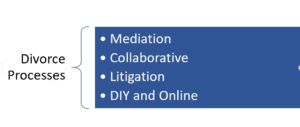SEVEN THINGS TO DO BEFORE YOU DIVORCE
Get Our FREE eBook!


Strap in—it’s going to be a rough ride.
The relationship you have with your spouse is likely the most important connection in your adult life. At one time, not long ago, you were in love and could not imagine a life without them. You may have had children together, even grandchildren! But something shifted and now here you are contemplating or in the midst of a divorce. Hold on, because divorce is not for sissies.
Whether you initiated the split, or your spouse did, whether it was sudden or has been years in the making, this is among the most traumatic and life-changing events you’ll ever experience. Divorce permeates all aspects of our lives: emotionally, psychologically, financially, socially, and physically. I see the impact of separation and divorce on people’s lives every day in my practice as a divorce mediator, financial advocate, and coach.
I know it, too, because I’ve been there. Growing up, I was a child of divorce, and it fundamentally impacted my life. My mom didn’t get the emotional, legal, or financial support she needed after my father left her while pregnant with her fourth child. She never really recovered and that was terribly sad. As for me, it certainly dampened my remaining childhood years and, in some ways, still has adverse effects.
I also divorced the father of my own three young children many years ago now and went through the incredibly painful and expensive process of a litigated divorce. All I knew back then was to pick up the phone and call an attorney. What ensued were years of court battles and what today would amount to about $100,000 in attorney’s fees. I knew there had to be a better way.
Today, I am fully dedicated to assisting individuals and couples through the divorce process in a way that leaves them as unscathed as possible, so that they and their children can move on to build a better future without long-lasting trauma. Be clear, though, divorce is not for sissies and you will need support.
Financially, you may wonder how you’ll ever be able to support yourself and your children, how you’ll be able to afford to retire or live the life you’ve worked so hard for. Will you be able to keep your home? Will you have to get a better-paying job?
As a mom or dad, you will have to adjust to the reality that your children will be sharing their time with the other parent and, potentially, a new partner. I cried my eyes out the first Thanksgiving that my children spent with the father and his family five hours away. As prepared as I thought I was, I was still alone without the ones I loved the most.
You will worry what effect all of this will have on your children, whether young or adult. Don’t kid yourself that the kids seem to be just fine. They aren’t. They need you to be a full-time parent if they are young and empathetic to their changing lives no matter what the age.
Socially, you will lose many friends that you shared as a couple. Some of your friends may treat you differently, be wary of your stories and woes, or feeling awkward when you’re the only single person in a group of couples. As for intimate relationships, will you ever be able to love someone again, and how about dating, how is that going to work?
Emotionally and psychologically, you aren’t going to be yourself for a while. You may feel confused and overwhelmed, question yourself about even the smallest things, be less productive at work or at home, occasionally or often be emotionally volatile, anxious, and/or depressed.
Your health may suffer, too. You may eat or drink too much, skip routine, preventative care, not get enough exercise, and have difficulty sleeping.
All of this is completely normal. Divorce is not for the uninformed and it won’t go away if you put your head in the sand. The question is not whether you need support but what kind and from which sources. It will not all be okay if you just hire the right lawyer.
I am here to tell you: divorce is not for sissies! So, get informed, build your support team, and keep reading this blog—its mission is to give you the information you need and show you the way to making the right decisions for a brighter future for you and the ones you love.

If you’re reading this, then obviously you’re thinking about ending your marriage. Before you initiate your divorce, I’m going to ask you to take a few steps to ensure the best outcome for you should you decide to move forward. This is not a decision to be taken lightly and a little preparation can go a long way.
The reality for lots of couples that have invested in each other for many years is that if you’re going to end the relationship, you now have to stop thinking emotionally and start thinking financially.
If your answer is anything but “Oh, I handle all our finances, I know exactly where we are,” then you have work to do. If you have been out of touch with your family finances for more than five years, don’t even try to get caught up. Get yourself to a CDFA® (Certified Divorce Financial Analyst) ASAP! You can find one in your area by going to the Institute for Divorce Financial Analysts. Do this BEFORE you tell your spouse you want a divorce. Your CDFA® will help you do a little digging to get some information before the information mysteriously disappears. They’ll also help you see what your financial life after divorce might look like.
This is the one thing you can do to save yourself a ton of money in the divorce process. Anything you can gather before you meet with either an attorney, a mediator, or a CDFA® will reduce the amount you ultimately have to spend out-of-pocket. Here a quick list of must-have documents.
Once you’ve gathered all the data, find a way to keep it all organized. Some people create a 3-ring binder with tables for each section, others put all their documents in a protected electronic environment like Dropbox, iCloud, or Google Drive. This is best when you need quick and easy access in a mobile format. Again, this will save you a lot of money down the road.

There are several ways to get a divorce, each with its own pros and cons. Which method you choose will be largely dictated by the relationship between you and your spouse. If you are afraid for your or your children’s safety for any reason at all of it your spouse is denying you access to enough cash to survive, get a lawyer.
If you believe you and your spouse will be able to rationally discuss and negotiate the details of your divorce and be fair and honest, you might consider a do-it-yourself divorce or use an internet service to guide you. Beware: just because you and your spouse are getting along today doesn’t mean it will always be this way.
Your county’s divorce website will most likely give you an overview of the process and forms you’ll need if you going the DIY approach. There are lots of cheap internet services, too, that can produce divorce forms for your jurisdiction, but not all counties accept their forms as-is. These cheaper alternatives may seem attractive upfront but the money it may take to correct any mistakes you make along the way could cost you thousands of dollars.
If your financial situation is a bit more complex, e.g., there’s a pension involved or one party is self-employed, or the idea
of DIY frightens you, then you should consider using a CDFA® as a financial neutral as part of a collaborative team
or as a mediator to help you craft a fair settlement. Your CDFA® may also be able to get your legal documents
prepared for you, too. When couples go this route, they are more likely to remain friends—it’s a respectful, honest way
to go through the process and saves both parties significant money by not having to pay expensive lawyers.
As a last resort, if one or both parties can’t manage to cooperate at any level and seem determined to go to war, then hiring attorneys may be your only option. Unfortunately, you’ll need to say goodbye to about $15,000 per spouse, at a minimum. A little preparation before you move forward with a divorce can go a long way towards reducing the cost of your divorce and creating a fair settlement. Wishing you a gentle divorce and a bright future!
The divorce process can be scary and overwhelming. Starting with a plan and professionals that you trust to guide you through the process can be key in making sure you’re ready for your future. If you’re thinking about divorce schedule your complimentary divorce strategy session where we’ll explore your options and connect you with any resources you might need.
Divorce is a life changing decision full of emotional and financial disruption. So when it comes to how you want to handle the ins and outs of asset division and custody arrangements, it’s important to weigh your personal circumstances carefully before committing to working with a family divorce mediator or a family lawyer.
While it’s true that most divorces don’t need to go to court and that divorce mediation has become a tried-and-true practice for modern divorce, sometimes hiring a family lawyer is a smart call.
Divorce is often a sticky topic. The emotionally charged aspect of divorce can cloud judgment and drag out the process. These are the types of divorces that need court intervention and are usually the most difficult ones.
If your divorce is contested, you, your soon-to-be-ex, or both of you have differences that make it impossible to reach a divorce agreement on your own. Generally, settlement negotiations try to find middle ground and carve out an equal division of shared assets. When a settlement agreement can’t be reached through a collaborative private negotiation, it’s settled in divorce court.
A divorce might seem amicable and uncontested when the paperwork is filed and in the initial talking phases, but emotions can really derail the process. Sometimes, this can involve an irrational attachment to shared possessions.
While both parties may believe that the best possible course of action for the future is divorce, this doesn’t make the act of divorce any easier. Emotions can often steamroll logic. Divorces that drag on become expensive. If you find that your emotions are overtaking reason, it’s probably best to work with a family lawyer.
Divorce is often a sticky topic. The emotionally charged aspect of divorce can cloud judgment and drag out the process. These are the types of divorces that need court intervention and are usually the most difficult ones.
If your divorce is contested, you, your soon-to-be-ex, or both of you have differences that make it impossible to reach a divorce agreement on your own. Generally, settlement negotiations try to find middle ground and carve out an equal division of shared assets. When a settlement agreement can’t be reached through a collaborative private negotiation, it’s settled in divorce court.
Family divorce mediation is a great choice for divorcing couples who are able to manage and sort out the emotions surrounding their divorce. If you are filing an uncontested divorce, then mediation can save you stress, time, and money.
Divorce mediators are knowledgeable in family law, and many professionals bring valuable legal and financial expertise to the negotiating table. Be sure to educate yourself on the mediation process and familiarize yourself with the services mediators offer. A divorce mediator can be a lawyer, a Certified Divorce Financial Analyst (CDFA®) or other appropriately trained individual. Be sure you understand the differences in your alternatives and which would be best suited for your case. The decision of choosing a family lawyer or a divorce mediator is a personal one. Asking the right questions can help you set reasonable expectations and make a decision on whether or not a mediator will meet your professional needs.
Is mediation right for you? Visit our website to schedule a free divorce strategy session online with TruNorth Divorce Solutions.
Get A free Consultation
484.321.6990
hello@trunorthdivorce.com
So, you’ve decided to seek a mediation for your divorce, and you’re exploring local options. With emotions running high, picking a divorce mediator in Annapolis can seem like a daunting task. The professional you decide to work with needs to hold a level of your trust—after all, they will be helping you and your soon-to-be-ex-spouse navigate the murky waters of divorce.
Choosing a mediator that fits your needs is a careful decision, it’s a good idea to do your homework ahead of time. Thinking about the types of things you might ask a professional mediator before you make the decision to commit to one is a good way to prep for an initial consultation. TruNorth Divorce Solutions has put together a quick list of questions that you might want to ask your prospective mediator.
This is a great question to ask during your initial meeting with a professional divorce mediator because odds are that this is the first time you’ve sought out a divorce mediation and are unsure about how the process works. Mediation is a collaborative effort between you, your ex, and the mediator you choose to work with.
It’s important to outline expectations before the mediation process begins, and this question can really flush out some of those expectations. Ideally, you want to work towards a divorce settlement that both parties are happy with. Your prospective mediator may go into detail about their strengths and what they bring to the negotiation table.
This is a great follow up question to ask in tandem with how your mediator defines success. The answer to this question can provide some much-needed confidence and really influence your choice.
The mediator will probably touch on the depth of their experience in the industry and how many divorcing couples they have worked with. They might also have some metrics (i.e., that they have successfully mediated XX divorces in the Annapolis area for X years) of success to share with you that reflect their professional expertise. They may even share some relevant anecdotes.
Ah, the price tag. An important question. Make sure to get these details during your initial consultation. Your mediator may bill hourly or have a flat rate mediation fee. While one divorce mediator in Annapolis may charge $1000 an hour for their services another may have a flat rate fee for services of $7000. Don’t make assumptions and ask for rates up front.
Remember, price isn’t always the main consideration behind choosing a mediator and shouldn’t necessarily deter you. While it is important to stay on budget, you should also consider the level of skill and expertise that the mediator has to offer.
Another great question to ask your divorce mediator is how long each session will last and how long the process takes overall. These questions can be particularly salient if your mediator bills by the hour.
The answer to this question also gives you an idea of how much time you will need to carve out of your schedule for the mediation process. You can also ask about whether your mediator holds private sessions (depending on your circumstances) and other questions surrounding the level of commitment expected of you.
Being unfamiliar with mediation, you probably want to ask about what is included with their services. Is the mediator drafting up divorce settlement documents for you? Will they be filing them on your behalf? Will you have to pay additional court costs or those included? Asking this question up front will help give you a clear picture of what to expect of your mediator.
Any reputable mediator would welcome these questions during your consultation, so you shouldn’t hesitate to ask. Looking for a divorce mediator in the Annapolis area? Contact TruNorth Divorce Solutions for a free divorce strategy session.
Get A free Consultation
484.321.6990
hello@trunorthdivorce.com